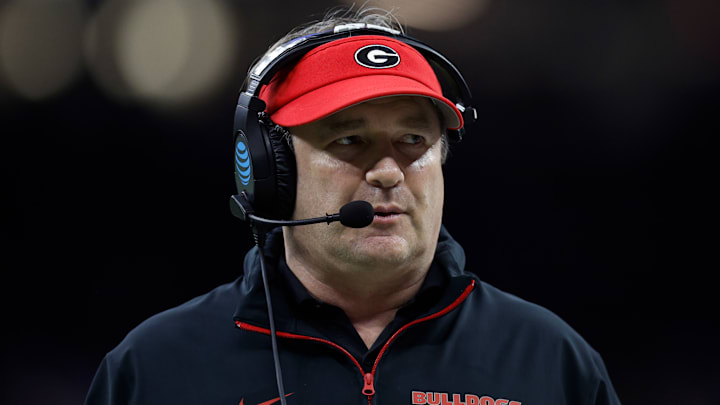Let’s be clear: if this new federal bill passes, Kirby Smart won’t be coaching college football for much longer.
A recently proposed piece of legislation making its way through Congress is sparking major waves in the world of college athletics—and not the kind that get fans cheering.
Tucked inside this newly-introduced federal bill is a salary cap for public university employees, and it’s aimed squarely at the big fish like Smart, Ryan Day, and Dabo Swinney. The bill proposes limiting any public university employee’s salary to ten times the total cost of attendance at the school they work for.
Now let’s break that down using Kirby Smart — the highest-paid coach in college football— as an example.
The current cost of attendance at the University of Georgia for an out-of-state student is around $49,708. Multiply that by ten and you get $497,080. Sounds like a decent paycheck, right? Sure—until you realize that Kirby Smart currently makes over $13 million per year. That means under this bill, his salary would be cut by over $12.5 million annually. Not exactly a rounding error.
So the big question becomes: why would someone like Kirby Smart, who has no shortage of suitors, stay at Georgia when the NFL could offer him a massive payday?
The answer? He wouldn’t.
This bill, whether intentionally or not, would likely push elite college football coaches straight into the arms of the NFL. If you can’t pay a guy who’s delivering national championships more than half a million dollars per year, you’re just asking for him to leave. The NFL would be happy to match or even exceed what Smart is currently making, and without the headache of this kind of federal restriction.
And it’s not just Smart. Coaches like Ryan Day, Lincoln Riley, Deion Sanders, and even up-and-comers with skyrocketing stock would have no reason to stick around the college game if their earning potential gets decimated overnight. It would completely change the landscape of college football as we know it. Forget big-time recruiting battles and high-profile hires—universities wouldn’t even be able to compete for top coaching talent.
Critics of the bill argue that capping coaching salaries won’t actually fix the issues it's supposed to address, like student debt or athletic department spending. Instead, it could kneecap the programs that help fund entire athletic departments through TV revenue, ticket sales, and merchandise. After all, Kirby Smart doesn’t just coach football—he prints money for Georgia.
And let’s be honest, the college football world runs on the shoulders of a few elite programs. If those programs suddenly become stepping stones to the NFL rather than destinations in themselves, the balance of power shifts in a major way. Players might still come for the exposure and the NIL money, but the overall product would take a hit.
In addition, the bill calls for "unlimited transfers" and changes to conference structure. While the conference structure changes might be welcomed, no one wants to see transfers get even wilder than they already are.
For now, the bill is just a proposal and we'd imagine it won't get too far.
